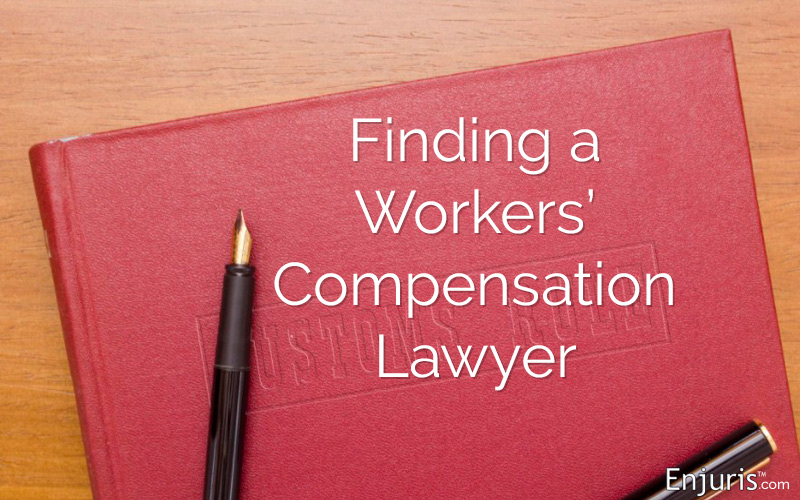How to get the best representation for your work injury case
Most employers in the United States who employ one or more people are required by law to carry workers' compensation insurance. While the specifics vary on a state-by-state basis, if you have been injured in a work-related accident, then it's likely you will be eligible for benefits under workers' compensation insurance.
However, even if you are entitled to benefits, your employer's insurance may not be too eager to hand them out. They might deny your claim, forcing you to appeal. In that situation, it helps to have an experienced workers' compensation attorney represent you.
Here are some tips for finding the best workers' compensation lawyer...
Get some recommendations from friends and family
The good thing about workers' compensation programs being so prevalent is that you very likely have friends, family or coworkers who have been through the process already.
Ask questions about their respective experiences and whether they were satisfied with their legal representation. If the case concluded in their favor, it would be prudent to ask for a referral.
Search online for a workers' comp attorney - but be wary
The internet is the easiest and quickest way to learn information about local workers' compensation attorneys - and you will want one in your area, because every program is different based on where you live. By typing a simple search into Google, you will find a host of lawyers in your city or town. Once you have narrowed your search, check out success rates, reviews and client testimonials. Be skeptical of what you read, and try to determine whether the reviews are genuine as opposed to that lawyer's mother leaving a nice note.
Once you have candidates in mind, make sure to check those names in your state's respective Bar office. Each state Bar (the entity that oversees and licenses lawyers) has a search function to see whether attorneys have a history of infractions on their record. This one, for instance, allows you to research Texas attorneys. Violations are very often not made public except in legal periodicals, which the general public does not read.
All attorneys' websites have a “Contact Us” section, where you can send an email outlining the details of your case. This is important because the lawyer can ascertain whether he or she has the necessary expertise to assist you. The speed with which they answer your inquiry is also an indicator of how important of a priority you are.
Schedule a consultation
After you narrow down your list of potential representation, arrange to meet with one to five attorneys who have demonstrated a high rate of success and have positive reviews. These initial consultations should be free, and it's recommended that you meet with more than one lawyer just to make sure you really like the one you pick.
During the meeting, ask questions. Don't be scared. Here are some ideas, and we also have a handy interview sheet to help you.

Worksheet with questions to ask a personal injury attorney to help determine if he or she will be a good fit for your case
Download in PDF format
Ask about:
- The attorney's success rate
- Background and experience
- Fees and expenses
- The estimated duration of your claim
- Who is responsible for the case
The more information you can get during the initial consultation, the better; use this information to make a decision regarding which lawyer can best help you.
Hiring a workers' compensation attorney
If you've been injured at work and are suffering health problems because of it, or if you have already submitted a claim only to have it denied, don't hesitate in starting the legal process. Your lawyer can advise you as to possible courses of action and determine whether you can gain access to the benefits you need.
You might also want to read the following articles for more information:
- Negotiating lawyers fees - how do accident lawyers charge? Are there any hidden costs?
- Preparing to meet with a personal injury attorney
- How damages are calculated
- Workers' Compensation
- 10 Telltale Signs of a Bad Workers’ Compensation Attorney
- Carpal Tunnel: A Leading Cause of Occupational Injury
- Common Injuries that Affect Nurses and Other Health Care Professionals
- Common Reasons Workers’ Compensation Claims Are Denied
- Directory of State Workers' Compensation Agencies
- FedEx Employee Injuries & Workers’ Compensation Claims
- Guide to Severance Pay, Unemployment, and Workers’ Comp Claims
- Guide to Social Security Disability Benefits
- H2S Exposure Illnesses & Workers’ Compensation
- Health Care Workers Are Suffering From Mental Health Issues
- Hearing and Vision Loss in the Workplace
- How Much Does A Workers’ Compensation Lawyer Cost?
- How to Prepare for a Workers’ Comp Doctor Evaluation
- How to Prevent Cold Work Injuries
- How To Prove Workplace Defamation & Sue for Damages
- How to Report a Workplace Injury
- Lump Sum vs. Lifetime Benefits For Your Workers’ Comp Settlement
- Manhole Injury Lawsuits and Workers’ Compensation
- Repetitive Strain Injuries in the Workplace
- Seeking Financial Compensation for a Firefighter or EMT Injury
- The Most Common Types of Occupational Diseases
- The Most Dangerous Professions in America
- Third-Party Workplace Injury Claims vs. Workers’ Compensation
- Tips for Finding a Skilled Workers' Compensation Lawyer Near You
- Tips to Help Prevent Heat Related Injuries
- What If My Employer Doesn’t Have Workers’ Compensation Insurance?
- What is Hazard Pay, and Who Are Essential Frontline Workers?
- White Finger Syndrome and Workers’ Compensation
- Workers’ Comp for Flight Attendants & Other Airline Employees
- Workers’ Compensation After a Poultry Plant Injury
- Workers’ Compensation For Cell Tower Technicians

